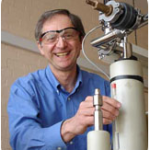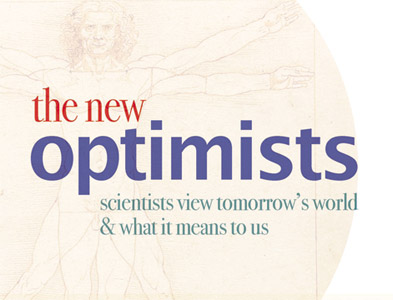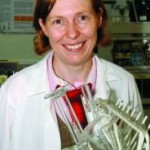The hundred or so elements of the Periodic Table determine everything we do, what our universe is made of, how the body’s biochemistry works, the drugs we take, the clothes we wear, the TV screens we watch . . . they make up the fabric, the substance of life.
 Professor Peter Sadler, whose research field is inorganic chemistry, the stuff of the Periodic Table, works at the interdisciplinary borders of inorganic chemistry, biology and medicine.
Professor Peter Sadler, whose research field is inorganic chemistry, the stuff of the Periodic Table, works at the interdisciplinary borders of inorganic chemistry, biology and medicine.
Which of the 81 stable elements on earth, he asks, are essential for life? Can the genome tell us? Probably not . . . We think certain metals, for example vanadium, chromium, nickel and tin are essential, but actually we know very little about them. If they are essential, should we be using them in medicine?
The basis of many therapies are carbon (organic) compounds. Many inorganic elements, however, are more difficult to study than carbon. Professor Sadler argues that the challenges and the scope for radical discovery lie here.
Professor Peter Sadler is Head of Warwick’s Chemistry Department. His research interests are the chemistry of metals in medicine (bioinorganic chemistry, inorganic chemical biology and medicine), and the design and chemical mechanism of action of therapeutic metal complexes, including organometallic arene anticancer complexes, photoactivated metal anticancer complexes (for photochemotherapy), metallomacrocycles as antivirals and stem-cell-mobilising agents, and metalloantibiotics. Besides synthesis of co-ordination complexes, his research involves studies of interactions with targets such as RNA, DNA and proteins, and often industrial and international interdisciplinary collaborations.














